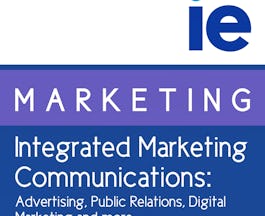Filter by
The language used throughout the course, in both instruction and assessments.
Choose the Public Relations Course That Aligns Best With Your Educational Goals

University of Colorado Boulder
Skills you'll gain: Communication, Public Relations, Media Strategy & Planning, Strategy, Brand Management, Leadership and Management, Marketing, Strategy and Operations, Planning, Social Media, Critical Thinking, Journalism, Writing

University of Colorado Boulder
Skills you'll gain: Brand Management, Communication, Leadership and Management, Media Strategy & Planning, Public Relations, Strategy, Marketing, Planning, Strategy and Operations, Social Media

IE Business School
Skills you'll gain: Marketing, Advertising, Communication, Media Strategy & Planning, Business Analysis, Business Psychology, Customer Analysis, Marketing Psychology, Marketing Management, Public Relations, Strategy

University of Colorado Boulder
Skills you'll gain: Public Relations

Starweaver

Skills you'll gain: Digital Marketing, Marketing, Marketing Management, Media Strategy & Planning, Sales, E-Commerce, Data Analysis, Social Media, Search Engine Optimization, Advertising, Communication, Persona Research, Strategy, Web Design, Web Development, Web Development Tools, Writing, Data Management, Market Analysis

Skills you'll gain: Cloud Computing, Cloud Applications, IBM Cloud, Cloud Infrastructure, DevOps, Cloud Platforms, Computer Programming, Javascript, Python Programming, Cloud Management, Web Development, Software Engineering, Software Architecture, Application Development, Cloud API, Cloud-Based Integration, Continuous Delivery, Microarchitecture, Cloud Storage, Continuous Integration, Full-Stack Web Development, Software As A Service, Docker (Software), Kubernetes, Software Engineering Tools, Software Testing, Django (Web Framework), NoSQL, SQL, Collaboration, Computer Science, Data Analysis, Front-End Web Development, Leadership and Management, Mergers & Acquisitions, React (web framework)

SkillUp EdTech
Skills you'll gain: Data Management, Data Visualization, Databases, SQL, Database Administration, Database Application, Database Design, Microsoft Excel, Data Structures, Python Programming, Data Analysis, Data Architecture, Database Theory, Spreadsheet Software, Plot (Graphics), Data Model, Data Warehousing, General Statistics, Mathematical Theory & Analysis, Basic Descriptive Statistics, Probability & Statistics, Statistical Analysis, Statistical Tests, Data Analysis Software, NoSQL, PostgreSQL, Statistical Visualization, Business Analysis, Data Visualization Software, Data Mining, Data Science, Interactive Data Visualization, R Programming, Tableau Software, Business Intelligence, Forecasting

Skills you'll gain: Marketing, Digital Marketing, Social Media, Advertising, Communication, Media Strategy & Planning, Marketing Management, Customer Analysis, Brand Management, Business Analysis, Marketing Design, Sales, Strategy and Operations, Data Analysis, General Statistics, Market Analysis, Probability & Statistics, Leadership and Management, Research and Design, Planning, Entrepreneurship

Skills you'll gain: Audit, Computer Security Incident Management, Leadership and Management, Risk Management

Skills you'll gain: SQL, Databases, Statistical Programming, Python Programming, Database Design, Programming Principles, Algorithms, Computer Science, Big Data, Software Testing, Application Development, Collaboration, Communication, Computer Programming, Data Analysis, Data Management, Data Model, Data Structures, Data Warehousing, Database Administration, Database Application, Database Theory, Django (Web Framework), Javascript, Leadership and Management, Linux, Problem Solving, Project Management, Software Engineering, Software Engineering Tools, Tableau Software, Tensorflow, Web Development
 Status: Free
Status: FreeYale University
Skills you'll gain: Finance, Investment Management, Risk Management, Banking, Behavioral Economics, Critical Thinking, Decision Making, Innovation, Regulations and Compliance, Underwriting, Leadership and Management
In summary, here are 10 of our most popular public relations courses
- Introduction to Public Relations and the Media: University of Colorado Boulder
- Principles of Public Relations: University of Colorado Boulder
- Integrated Marketing Communications: Advertising, Public Relations, Digital Marketing and more: IE Business School
- The Nuts and Bolts of Public Relations: University of Colorado Boulder
- Strategic Public Relations Planning: Starweaver
- Google Digital Marketing & E-commerce: Google
- IBM Full Stack Software Developer: IBM
- IBM Business Intelligence (BI) Analyst: SkillUp EdTech
- Meta Social Media Marketing: Meta
- Play It Safe: Manage Security Risks: Google










